History Culture
Poland, Lithuania, Russia: Respect for the dead!
30 Nov 2012Lithuanian police have arrested five people after a tomb containing the heart of Polish national hero Jozef Pilsudski was vandalised in Vilnius on November 24th. The bunch of thugs also draped a banner with the words “Poles die” and left a box with “attention bomb” and “TNT” written on it. 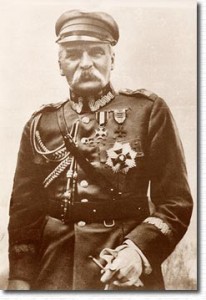
The Polish ambassador in Vilnius, Janusz Skolimowski said he has received assurances that security will be stepped up at the Rossa Cemetery. Pilsudski was born in Zulow near Vilnius, then part of the Russian empire, in 1887. After his death in 1935 his body was buried in Krakow, while his heart was taken to Vilnius.
At the same time, the Vremya news magazine on Russian Channel One reported that in 1953, when Polish authorities decided to dig up the remains of Russian soldiers who died fighting Nazi German forces in Kostrzyn nad Odra in western Poland, so as to re-bury them in large cemeteries around the country, they did so by only partially removing all the body parts.
Last October a research dig found that 102 out of 110 bodies had been re-buried with their skulls or other parts missing.
The Russian news programme claimed the “barbaric” exhumations showed a “monstrous lack of respect for the dead” and reported that Russian authorities had called on Poland to give a full explanation as to why the bodies of “soldiers who liberated Poland from Nazi Germany” were shown so little respect.
“Standards in 1953 differed significantly from those of today,” Adam Siwek from Poland’s state-backed Council for the Protection of Struggle and Martyrdom has already answered.
Source: Polish Radio
Poland, Aftermath. A new Jewish pogrom film.
13 Nov 2012“I am very happy that such a film was made in Poland” veteran director Andrzej Wajda said after the film’s press premiere in Warsaw.
Minister of Culture Bogdan Zdrojewski highlighted that: “I admire the courage in taking up such a difficult theme and analyzing, in a cinematic form, a dramatic episode in Poland’s history”. 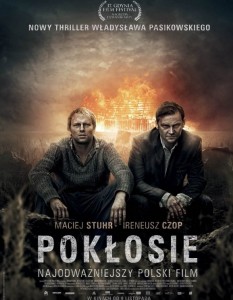
Aftermath is a Polish-Dutch-Slovak-Russian co-production.The cast includes several top Polish actors – Maciej Stuhr, Zbigniew Zamachowski and Jerzy Radziwiłowicz.
Inspired by the 1942 tragedy in which hundreds of Jews were burned alive in a barn, an event long blamed on Nazi Germany, “Poklosie” (“Aftermath”) was directed by Wladyslaw Pasikowski.
“I wanted to tell a story that would interest a broad number of Poles because it is one of the most painful parts of our country’s history,” Pasikowski explained. “We already have a huge number of films on the horrors committed by the Soviets and the Germans, and it’s time to say what bad things we did ourselves.”
The director was inspired by “Neighbours”, a book by Polish-origin US historian Jan Tomasz Gross, which sent shock-waves across Poland after his publication in 2000. The date of the massacre in the village of Jedwabne, some 190 kilometres northeast of Warsaw, has entered Poland’s remembrance calendar.
“This museum is an eloquent declaration of the principles of tolerance toward people and their freedom,” said at the inauguration Israeli President Shimon Peres, 89, who was born in what is now Belarus before his family settled in Palestine in the 1930s. Peres recalled that both his parents had been born in the Russian Empire and everyone at home spoke “Yiddish, Hebrew and Russian”, while his mother had sung him Russian songs. “Here we can see man part with the past and move into the future with hope.” “The museum tells us about two ideologies – communism and Zionism,” he added. 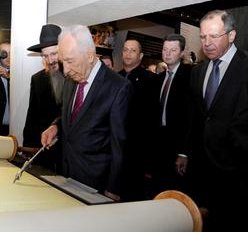
President Vladimir Putin hoped the new museum would become “a place for dialogue and agreement between peoples,” said a statement read at the ceremony by Lavrov. “Any attempt to review the contribution of our country to WWII victory or to deny the Holocaust is not just a cynical lie but a forgetting of history,” Putin’s statement added.
The idea of establishing the museum came from the Federation of Jewish Communities of Russia, which was given the museum building in 2001. Grafts’ renovation and expansion of the 1927 Konstantin Melnikov’s bus depot have transformed the space into the world’s largest Jewish museum. The museum occupies over 8,500 square meters on the Moscow Bakhmetyevsky Garage which was formerly an art gallery run by socialite Dasha Zhukova.
The museum aims to demonstrate Jewish cultural traditions and customs and also show the history of Russia through the prism of one ethnic group, organizers say.
Like its ‘twins’ in New York, Paris and Berlin, the Moscow museum highlights historic Jewish documents, photographs and letters spanning a period of more over two centuries.
Jews were repressed in Tsarist times when starting in the late 18th century they were largely forced to live in an area of the western Russian empire known as the “Pale” where many lived in impoverished towns known as shtetls.
Hitler‘s armies in World War II then occupied most of today’s Belarus, Ukraine as well as western Russia, leaving Soviet Jews exposed to the full brunt of the Nazi killing regime.Heavily targeted during the 1930s purges, Jews suffered even after World War II in the USSR under Stalin’s rule, especially when the purported discovery of a so-called “doctors’ plot” against him unleashed a wave on anti-Semitic hysteria.
Nonetheless Jews have over centuries made a huge contribution to Russian culture, ranging from the writer Sholem Aleichem, the Vitebsk-born artist Marc Chagall or the poet Osip Mandelstam who died in the Stalin camps.
Sources: Ria Novosti, EJR.
On October 9th at 2 p.m. meeting in support of Radio Liberty at the US embassy in Moscow. On October 10th journalists.

—
To the International Committee of the U.S. Congress
U.S. Secretary of State Hillary Clinton
Senator Benjamin Cardin
September 27, 2012
Dear Mr. Cardin, dear Ms. Clinton
We deeply regret to officially announce that following the decision of the management Radio Liberty stops its medium- wave broadcasts.
It has been done at the moment, when the regime of Vladimir Putin launched a new attack on the freedom of speech and Democratic movements in Russia. Human rights organizations are declared “foreign agents”, USAID stops its work in Russia.
Radio Liberty has existed for more than 60 years and for the whole generations of 1960- 80th was a source of accurate information. Current situation in Russia looks more and more like USSR. Current domestic and foreign policy is determined by people, who came from KGB and it is becoming clear, that we cannot lose the traditions of the station, which has always been taking very active civil position based on the universal values of freedom, democracy and human rights. In today’s Russia all these values are being attacked by the government.
Reorganization of Radio Liberty work was carried out in a form of shameful and abusive for its employees “special operation”. Any KGB could not harm the image of the radio and the United States in Russia as did US managers- the President of the Radio Liberty Steven Korn and the vice- president Julia Ragona.
They have ignored BBG’s (Broadcasting Board of Governors) findings confirming the effective work of the Russian service of Radio Liberty (http://www.bbg.gov/wp-content/media/2012/02/FY-2013-BBG-Congressional-Budget-Request-FINAL-2-9-12-Small.pdf). A team of journalists, who used to create radio and internet content, a team that used to bring hundreds of thousands of spectators of democratic rallies broadcasts in 2011-2012 is dismissed.
Mr. Korn and Ms. Ragona’s staffing solutions were conducted without even slightest consideration of the creative contribution and potential of each employee. Dismissed are the professionals with stainless reputations. Some of the journalists have left Moscow office of Radio Liberty deliberately on moral grounds.
Additionally a new head of the Russian service is assigned a person, who received negative assessment as a manager at her previous jobs. A person never previously engaged in a kind of work offered by the Radio Liberty.
Mass dismissals of journalists have disorganized the work of the broadcast and the work of the radio’s website for extended period.
Scandalous publication about the activities of American management team of the radio appeared in Russian and foreign press. The managers themselves could not explain their decisions to the Russian society. These decisions look very strange, while the financing of the Russian service for years 2012- 2013 has not been reduced, but in fact even increased.
From now on, every time Russian authorities will decide to close one or another independent media, they will refer to for them very convenient “experience” of the management of Radio Liberty.
We do not have any information about a new concept of multimedia portal that was proposed instead of public over- the –air and internet broadcasting and we are concerned that this new concept might be contradictory to the goals and missions established by the U.S Congress and BBG and to the goals and missions of Radio Liberty in Russia.
We ask the Congress to set up a special commission to investigate the activities of the Radio Liberty’s management, which caused such damage to the image of the United States in Russia and review the decisions that have been made.
With kind regards,
Lyudmila Alekseeva, Chairwoman of the Moscow Helsinki Group
Sergei Kovalyov, Chairman of the Russian “Memorial”, the chairman of the Public Commission for the Preservation of the Heritage of Academician Sakharov — Andrei Sakharov Foundation
Vladimir Bukovsky, Writer, a former political prisoner in the Soviet Union
Tatiana Yankelevich, Center Associate, Davis Center for Russian and Eurasian Studies Harvard University, Cambridge, MA, daughter of Elena Bonner and Andrei Sakharov
Pavel Litvinov, a former political prisoner in the Soviet Union
Alexei Simonov, the President of the Glasnost Defense Foundation
Lev Ponomarev, Executive Director of the Russian movement “For Human Rights”
—
What happened at Radio Liberty in Russia. Elena Rykovtseva in Novaya Gazeta.
Bykivnia, the Ukrainian Katyn.
21 Sep 2012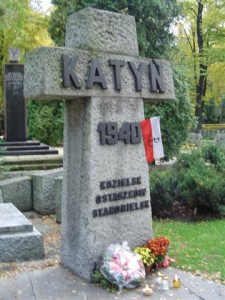
copyright EuropaRussia
“We had to wait a long time for this moment, fervently believing that it must come to pass. It is difficult to find words that express how we Poles feel” Polish President Bronislaw Komorowski said during the ceremony.
The wooded site at Bykivnia is understood to be the final resting place of 3,435 Polish citizens murdered in 1940 on Stalin’s orders by the Soviet secret police (NKVD).
The executions were part of the broader Katyn Crime in which over 22,000 Poles – largely reserve officers – were killed in mass executions at various points across the Soviet Union, including the Katyn Forest near Smolensk.
The final resting place of the Poles on the so-called “Ukrainian Katyn List” had long remained a mystery. In 2007, Polish archaeologists working at Bykivnia discovered the dog tags of Sergeant Jozef Naglik, as well as a comb with the names of four Poles inscribed on it.
The names tallied with the so-called Ukrainian List, which makes up about 15 percent of the Poles executed during the Katyn Crime. Identifying individual victims has proved largely impossible.
According to researched data, the mass burials in Bykivnia are the largest ones in Ukraine. Preliminary estimates indicate that during 1937-1941 more than 100,000 Ukrainians were also destroyed and secretly buried here.
Ukrainian President Vikor Yanukovich called the opening of the Polish war cemetery a “a moment of Solidarity between the two nations.”
Sources: Polish Radio, Memorial Kiev
Вопрос №1:
Кто победил в Бородинском сражении? Кутузов и Наполеон считали итогом битвы победу своей армии.
Вопрос №2:
Русские войска отступили и от Бородина, и от Москвы, а Наполеон вошел в Москву? Не является ли это свидетельством поражения?
Вопрос №3:
До сих пор ведутся споры о том, какова была численность обеих армий перед сражением и каковы были потери. Можно ли говорить, что российская армия превосходила по численности французскую?
Вопрос №4:
Можно ли утверждать, что французы выиграли сражение, но проиграли войну в целом?
Вопрос №5:
Для кого Бородинское сражение и его итоги были важнее — для Наполеона или для Кутузова?
Отвечают:
Александр Валькович президент Международной военно-исторической ассоциации
Наталья Басовская профессор РГГУ, историк
Pussy Riot. Позор, какой позор!
21 Aug 2012 «Россия, без сомнения, уникальная страна. Какая другая держава могла подарить миру такой шедевр, как Pussy Riot? Большие блестящие глаза, мягкие ресницы и беззащитная улыбка непонимания на скамье подсудимых. На них гневно лают и прокурор, и судья, и православные блогеры; против них весь госаппарат путинского самодержавия, правосудие которого международная общественность сейчас сравнивает с мракобесной инквизицией средних веков. Однако, не надо обижать средние века… 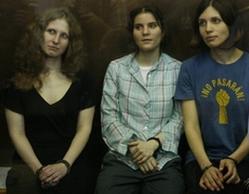
Мадонна в шоке, Горбачев, Стинг и немецкий Бундестаг. Запад солидарен. На улицах Москвы, Праги, Парижа, Дублина собираются девушки в пестрых балаклавах и нелепых платьях московских панк-паночек, чтобы орать: “Free Pussy!”, “Свободу Pussy Riot!”. Бесспорно, они сейчас получают более широкую поддержку на Западе, чем когда-то все советские диссиденты вместе взятые. И – извините, но уж так получилось – они сейчас самая известная музыкальная группа России за рубежом. А раскрутили их патриарх Кирилл, его пиар-советники да Хамовнический Суд.
Российские власти вряд ли смогли бы придумать нечто более эффектное, чтобы показать всему цивилизованному миру: мы не правовое государство, мы империя зла и глупости, мы никогда не будем с вами… »
Статья Штефан Шолль – Московский Комсомолец № 26019 от 20 августа 2012 г., Stefan Scholl Moskovskij Komsomolets.
Pussy Riot, le istituzioni cadute nella loro trappola. La biografia scabrosa di Nadezhda Tolokonnikova.
20 Aug 2012 Quando sono entrate nella Cattedrale di Cristo il Salvatore le Pussy Riot erano delle perfette sconosciute, oggi sono famose in tutto il mondo.
Formatosi nell’agosto 2011, il gruppo punk-rock femminista ha scelto la strada della provocazione e dello scandalo per imporsi. In pratica, la stessa strategia pubblicitaria seguita dalle colleghe ucraine protettrici dei diritti delle donne, “Femen”, che si mostrano nude ad ogni occasione pubblica utile. L’uso sapiente di Internet ha poi fatto il resto.
Adesso, dopo sei mesi di reclusione preventiva, le massime star musicali mondiali si sono mobilitate per la loro liberazione, fior di impresari se le contendono tenendo pronti assegni pieni di zero e giovinastre impertinenti imitano il loro canto anti-potere in giro per l’Europa.
Proprio giovedì 16 il marchio “Pussy Riot” è stato ufficialmente registrato. In Russia diventerà uno dei simboli della protesta anti-Cremlino soprattutto a partire dall’autunno che si attende assai caldo, mentre all’estero sarà un “brand” dell’anti-potere, degli anti-globalisti, sostengono gli esperti.
Le tre ragazze hanno insomma vinto alla lotteria ed, appena fuori di galera, potranno godersi una montagna di soldi. Le offerte di lavoro non mancano, nonostante, a giudicare dai video, non sappiano poi cantare e ballare così bene (hanno un repertorio assai limitato) e non siano delle bellezze di prima grandezza.

La più disinibita delle tre, la ventiduenne Nadezhda Tolokonnikova, ha appena ricevuto l’invito a posare senza veli per l’edizione ucraina di “Playboy”. In passato la ragazza, appena diciottenne, era entrata nelle cronache scabrose della capitale russa per aver partecipato in un museo ad una mega-orgia.
L’evento, denominato “Fotti l’orso”, era stato organizzato da un gruppo art “Vojna”, di cui faceva parte il marito, Piotr Verzilov. L’obiettivo era quello di protestare contro il passaggio di poteri al Cremlino tra Putin e Medvedev (cognome che assomiglia alla parola “orso”).
Nadezhda, studentessa di filosofia, era in cinta di nove mesi e quattro giorni dopo l’orgia aveva dato alla luce la figlia Geru. Le foto, in cui era impegnata in esibizioni erotiche, avevano provocato discussioni a non finire.
Nel 2010 la ventenne ha partecipato ad altre azioni clamorose, come quella di lanciare degli scarafaggi all’interno di un edificio dove ha sede un tribunale di Mosca o di disegnare un enorme fallo su un ponte a San Pietroburgo. Per l’ultima eroica azione Nadezhda ha ricevuto il premio “Innovazione”.
Chi la conosce la descrive come una provocatrice professionista, abilissima nel far cadere gli avversari nei suoi tranelli, una persona che sa esattamente quello che fa. Il Cremlino e la Chiesa ortodossa sono finiti nella sua trappola, trasformando con questo processo-scandalo delle sconosciute in eroine.
Pussy Riot condannate per teppismo religioso.
19 Aug 2012 “Vergogna! Vergogna!”. La folla urla indignata all’esterno del Tribunale. “Basta con lo stato di polizia”, uno degli slogan più ripetuti. Il giudice Marina Syrova ha appena letto la prima parte della sentenza in cui si condannano le Pussy Riot per “teppismo motivato da odio religioso”. 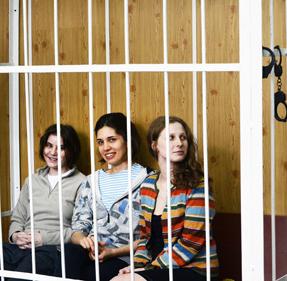
Nadezhda Tolokonnikova, Ekaterina Samutsevich e Maria Alekhina non fanno una piega. Anzi, ad un certo punto iniziano a sorridere a destra e a manca. Le tre componenti del gruppo punk-rock non si erano di certo fatte illusioni. Lo sapevano che le attendeva un soggiorno nelle patrie galere.
Rischiavano ben sette anni di carcere. Decisamente troppi! Tanto che il presidente Putin in persona era intervenuto pubblicamente nei giorni scorsi per chiedere clemenza alla corte.
Come si ricorderà il 21 febbraio, in piena campagna elettorale, le Pussy Riot sono entrate nella Cattedrale moscovita di Cristo il Salvatore – tempio principale dell’ortodossia russa – e davanti ad uno degli altari hanno inscenato una canzone-preghiera punk, registrata in video e postata su Internet, con la famosa invocazione “Vergine Maria, liberaci da Vladimir Putin”. Dopo qualche giorno sono state arrestate.
Il giudice Syrova ha spiegato che le tre imputate hanno offeso i sentimenti dei fedeli ortodossi ed hanno mostrato una “completa mancanza di rispetto”. Il loro reato è evidente: “hanno violato gravemente l’ordine pubblico”. Le testimonianze dell’accusa sono state citate e si è sottolineato che l’atto è stato “blasfemo” e non politico, poiché la famosa invocazione alla Madonna sarebbe stata inserita in un secondo momento, durante il montaggio del video, e non pronunciata nella cattedrale.
Ed in effetti le Pussy Riot, come loro stesse hanno ammesso nel corso del dibattimento processuale, ce l’avevano soprattutto con il patriarca Kirill, che aveva pubblicamente sostenuto la candidatura di Putin al Cremlino.
In queste ultime settimane sono comparse divisioni inattese nel mondo religioso. Se alcuni esponenti ufficiali ortodossi chiedevano la condanna delle tre ragazze un folto gruppo di sacerdoti ha sottolineato con dichiarazioni alla stampa che una delle funzioni pastorali è quella del perdono e non della condanna dei peccatori.
La galassia liberal-riformista anti-Cremlino ha, invece, definito il processo contro le Pussy Riot come qualcosa di simile all’“Inquisizione” spagnola per il tipo di accuse rivolte alle tre imputate.
“Come la maggior parte dei processi politici – ha commentato Ljudmila Alekseyeva, presidente del gruppo di Helsinki per i diritti umani -, questo processo non rispetta la legge, il buonsenso, la pietà”. Molto perplesso è apparso anche l’ex leader sovietico Michail Gorbaciov, secondo cui questo dibattimento si sarebbe dovuto svolgere non in un’aula di tribunale bensì in una commissione speciale.
In un messaggio fatto pervenire ai mass media attraverso i suoi avvocati Nadezhda Tolokonnikova ha affermato che “la nostra incarcerazione è il chiaro segnale che la libertà è stata scippata al nostro Paese”.
Con una Russia in preda a forti paure per il futuro e preoccupata per la recente approvazione di una serie di leggi liberticide, ci mancava proprio questo processo-scandalo, ennesimo segnale negativo della crisi psicologica e politica, in cui è sprofondata l’ex superpotenza da un anno a questa parte. Ossia da quando uno stanco Vladimir Putin ha scelto di tornare alla presidenza federale. I sondaggi danno la sua popolarità in caduta libera.
Video originale
Video successivo

на варшавском мосту через Вислу
«Группы хулиганов на варшавском мосту через Вислу, который стал главным местом стычек, выступали под известным по польским народным восстаниям ХIХ века лозунгом «Бог, Честь, Отчизна». Некоторые фанаты имели на груди значок «Польша сражается», который поляки носили во время немецкой оккупации. А некоторые добавили к этим великим символам футболки с надписью по-английски «Фак Евро» или с чисто польским лозунгом «Вы…би 2012». Так что речь идет не только о вечном споре славян между собой и ненависти к своему правительству, но и, если хотите, о конфликте цивилизаций.
Чемпионат Европы для польских „ультрас” и „фанатикс” – самое тяжелое оскорбление культивированной на протяжении многих лет стадионной культуры, которая рождалась в местах стычек самых агрессивных фанатов «Легии», «Вислы», «Силезии»….
Эти фанаты не хотели Евро-2012…
Патриотические декорации и антиправительственные выпады появились на польских стадионах, когда фанаты начали борьбу с антипатриотическим, по их мнению, правительством Дональда Туска. Фанаты ощущают себя борцами за Польшу….
Почему «патриотичные фанаты» хотят испортить образ Польши в глазах мировой общественности? Да просто потому, что фанатов положительный имидж государства не сильно волнует… »
Статья – Павел Вронски, польский журналист Московский Комсомолец № 25965 от 18 июня 2012 г.
Welcome
We are a group of long experienced European journalists and intellectuals interested in international politics and culture. We would like to exchange our opinion on new Europe and Russia.
Categories
- Breaking News (11)
- CIS (129)
- Climate (2)
- Energy&Economy (115)
- EU Eastern Dimension (85)
- Euro 2012 – Sochi 2014 – World Cup 2018, Sport (43)
- Euro-Integration (135)
- History Culture (198)
- International Policy (261)
- Military (74)
- Interviews (18)
- Italy – Italia – Suisse (47)
- Odd Enough (10)
- Poland and Baltic States (126)
- Religion (31)
- Russia (421)
- Survey (4)
- Turning points (4)
- Ukraine (176)
- Российские страницы (113)
Archives
- November 2020
- October 2020
- September 2020
- August 2020
- July 2020
- May 2020
- April 2020
- March 2020
- January 2020
- December 2019
- November 2019
- October 2019
- September 2019
- August 2019
- July 2019
- June 2019
- May 2019
- April 2019
- March 2019
- February 2019
- December 2018
- November 2018
- October 2018
- September 2018
- August 2018
- July 2018
- June 2018
- May 2018
- April 2018
- March 2018
- February 2018
- January 2018
- December 2017
- November 2017
- October 2017
- September 2017
- August 2017
- July 2017
- May 2017
- March 2017
- January 2017
- December 2016
- November 2016
- October 2016
- September 2016
- July 2016
- June 2016
- May 2016
- April 2016
- February 2016
- January 2016
- November 2015
- October 2015
- September 2015
- June 2015
- April 2015
- March 2015
- February 2015
- January 2015
- December 2014
- November 2014
- October 2014
- September 2014
- August 2014
- July 2014
- June 2014
- May 2014
- April 2014
- March 2014
- February 2014
- January 2014
- December 2013
- November 2013
- October 2013
- September 2013
- August 2013
- July 2013
- June 2013
- May 2013
- April 2013
- March 2013
- February 2013
- January 2013
- December 2012
- November 2012
- October 2012
- September 2012
- August 2012
- July 2012
- June 2012
- May 2012
- April 2012
- March 2012
- February 2012
- January 2012
- December 2011
- November 2011
- October 2011
- September 2011
- August 2011
- July 2011
- June 2011
- May 2011
- April 2011
- March 2011
- February 2011
- January 2011
- December 2010
- November 2010
- October 2010
- September 2010
- August 2010
- July 2010
- June 2010
- May 2010
- April 2010
- March 2010
- February 2010
- January 2010
- December 2009
- November 2009
- October 2009
- September 2009
- August 2009
Our books




